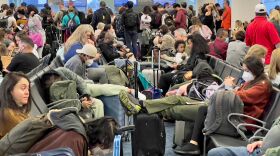RALEIGH — Gov. Roy Cooper on Wednesday extended a trio of executive orders allowing for curbside alcohol sales, a halt to evictions and a requirement for people to remain at home from 10 p.m. to 5 a.m.
North Carolina's modified stay-at-home directive that was set to expire on Friday will now remain in place until Feb. 28, while the eviction moratorium and allowance for the sale of “to-go” or delivery of mixed beverages remains in place through March 31.
The Democratic governor's extensions come as prominent state Republicans expressed their frustrations over a new coronavirus vaccine distribution strategy from Cooper's administration that critics argue has prioritized speed over equity.
During a news conference, Cooper reiterated his desire to distribute the doses received by President Joe Biden's administration quickly and equitably.
“The top priority in our state is getting vaccines to people as quickly and as equitably as possible,” Cooper said. “As of today, North Carolina has administered 99.8% of all the first doses that we have received from the federal government.”
When the first round of vaccines became available last month, state health officials sought to lay a strong foundation that allowed all 100 counties to receive vaccines proportionally based on population.
But a rocky rollout that saw few shots getting into peoples' arms boosted concerns that the federal government could reduce the state's weekly allocation. This prompted an abrupt shift over the last week favoring mass vaccination clinics and resulting in thousands of residents in lesser populated areas getting appointments postponed or canceled.
Top Republican lawmakers on Wednesday signaled more scrutiny of the vaccine rollout.
Senate leader Phil Berger told reporters it makes no sense why state officials couldn’t distribute doses to ensure vaccine appointments occur as scheduled. Instead, Berger said, some older residents whose appointments were canceled may have to wait a month longer to obtain a shot.
“The people of the state deserve better than that,” Berger said. “It’s just an indication that they’re making it up as they go along, as opposed to planning things out and making sure that we have the best possible distribution plan.”
House Speaker Tim Moore announced that he asked the chamber’s health committee to hold more hearings about the changing distribution plan.
Moore wrote to legislators that local health departments are receiving inconsistent messages, which is “damaging the credibility of state and county officials with citizens who rely on them for critical information about this process."
In a letter on Friday, North Carolina's eight congressional Republicans demanded answers from Cooper on a series of questions, one of which asked, “How does the state ensure adequate doses are received in rural and underserved areas?”
Mandy Cohen, the state's top public health official, said on Tuesday that the state would share 70% of its doses equitably based on population, while the remaining 30% would be earmarked for racial and ethnic minorities and providers hit by the shortfalls that the state's policy shift fueled.
Cooper said he understands the frustrations of people who saw their doses redirected to larger sites.
“I know that it is frustrating for people,” Cooper said. “They want their vaccines, and they want them now because they will help protect you from this deadly disease. The biggest problem that we face right now is we have millions of people who need it, but only thousands of shots.”
The state expects to receive about 140,000 weekly new first doses of the Pfizer and Moderna vaccines over the next three weeks starting next week. The 16% increase in supply from the Biden administration represents an additional 20,000 doses.
___
Follow AP coverage of the virus outbreak at https://apnews.com/UnderstandingtheOutbreak.
___
Follow Anderson on Twitter at https://twitter.com/BryanRAnderson.
___
Anderson is a corps member for the Associated Press/Report for America Statehouse News Initiative. Report for America is a nonprofit national service program that places journalists in local newsrooms to report on undercovered issues.
___
Associated Press writer Gary D. Robertson in Raleigh contributed to this report.
Copyright 2021 WFAE. To see more, visit . 9(MDAxNzg0MDExMDEyMTYyMjc1MDE3NGVmMw004))









